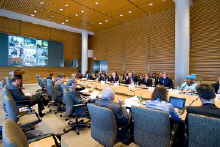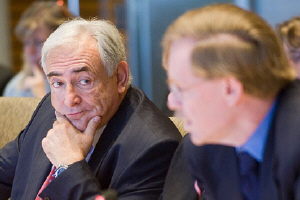The IMF and Civil Society

Civil Society organizations discuss food price policy with IMF MD Strauss-Kahn and WB President Zoellick
IMF and Civil Society Discuss the Global Food Crisis
May 29, 2008
At a May 23 video conference, IMF Managing Director Dominique Strauss-Kahn and WB President Robert Zoellick consulted with civil society organizations (CSOs) from Africa, North and South America, Asia, and Europe to identify priorities for addressing the world's food crisis.
The video conference, held at the World Bank's headquarters in Washington, D.C. was convened by the World Bank President and chaired by Ngozi Okonjo-Iweala, its Managing Director. David Nabarro, UN Assistant Secretary-General and Deputy Coordinator of the UN Task Force on the Global Food Security Crisis, and Anne Veneman, Executive Director of UNICEF, also participated.
Robert Zoellick said that CSOs have an absolutely critical role to play, given their presence in the field, their role in food distribution and their advocacy work. He called the issues of malnutrition the "forgotten Millennium Development Goal".
He also highlighted the call for addressing:
- the financial the needs of the World Food Programme (WFP);
- the interagency work on country needs assessments;
- the issue of helping small farmers (in the short term but also looking at food price volatility in the long run);
- long-term challenges of production and productivity;
- the overlooked research agenda;
- the need for risk management solutions (such as drought derivatives).
Strauss-Kahn told representatives of more than 30 CSOs that some countries affected by the crisis are taking sensible steps to cushion the impact and improve agricultural output, but cautioned countries against adopting policies which might have long-term negative consequences. Read more about Strauss-Kahn's advice (May 23, 2008)
CSO Response

During his remarks at the videoconference, Strauss-Kahn (left) encouraged CSOs to share their views and ideas.
Many CSOs, which included InterAction, Catholic Relief Services, and Bread for the World, applauded the initiative to consult with civil society this early in the process (and also raising the issue so prominently in April). Comments focused on collaboration and coordination.
Representatives reacted positively to the dialogue and asked for a replication at the country level to include farmers in the process. There were concrete suggestions, for example: applying the models for "International Health Partnership" or "Fast Track Initiative for Education" to agriculture.
CSOs also pointed out that coming up with constructive suggestions and trying to find joint solutions for complex problems is crucial, and that all efforts should focus to turn these new challenges into opportunities. They agreed that it is very useful to have all country information available on external websites.
Other food policies and programs
Zoellick also talked about the fast track "Global Food Crisis Response Program" which the Bank is working on, especially concerning the most vulnerable countries, and addressed the policy issues of export barriers, energy and food linkages (sugar-based biofuels don't have the same impact on food prices as other crops), and the Doha round of trade negotiations.
He also listed the upcoming major events, including the Tokyo International Conference on African Development (TICAD), the High-Level Conference on World Food Security in Rome on June 35, and the G7 and G8 meetings, saying that these were major opportunities to move forward on the issue. He asked CSOs to help raise the profile of the WFP, share assessments on the ground with all agencies, and give input on the key policy issues affecting food prices.
